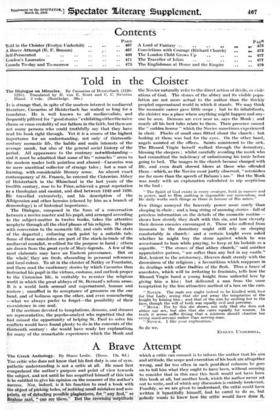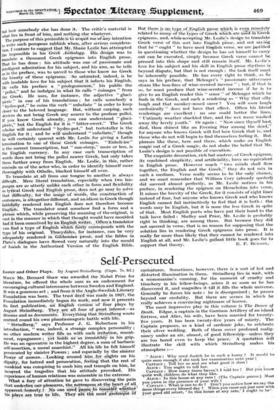A Brave Attempt
The Greek Anthology. By Shane Leslie. (Bonn. 12s. 6d.) 'tt:IE critic who does not know that his first duty is one of sym- pathetic understanding is not a critic at all. He must first comprehend the author's purpose and point of view towards the subject, and not until he has acquitted himself of this task Is he entitled to give his opinion on the measure of the author's Success. Nor, indeed, is it his function to read a book with the object of picking holes, of noticing small mistakeS and mis- prints, or of detecting possible plagiarisms, for " any fool," as Braluns said, " can see them:' But the crowning ineptitude which a critic can commit is to inform the author that his aim and attitude, the scope and execution of his book are altogether wrong, and far too often in such pontifical columns he goes on to tell him what they ought to have been, without seeming to consider that in this case this book would not have been this book at all, but another book, which the author never set out to write, and of which any discussion is entirely irrelevant. Possibly, so we are given to understand, the critic could have written it beautifully himself, had he cared to do so, but 'nobody wants to know how the critic would have done it but how "somebody else has done it. - The critic's material is what lies in front of him, and nothing-else whatever. The purpose of this preamble is to acquit me of-lny intention to write such pompous rubbish when, after serious considera- tion, I venture to suggest that Mr. Sharie Leslie has attempted the impossible in his Greek Ailthology. His design was to translate a thousand Greek epigrams into English prose. That he has done : his attitude was one of passionate and intelligent admiration for his subject, and his aim, as he tells as in the preface, was to unveil to those who know no Greek the beauty of these epigrains.." SO, satfirated, indeed, is he with laudable love for his subject that it infects his English. lie calls his preface a _"..prolegomenon," his public the " polloi," and he indulgeS in what Ife eatfs -4- coinages " from the Greek. He uses, for instance, the adjective " gluci- picric" in one of his translations ; he calls somebody a " hydro-pot," he coins the verb " enheliate " in order to keep closer to the beloved language. But, without carping, such devices do not bring Greek any nearer to the profane polloi. If you know Greek already, you can understand ." gluci- picric," but the English for it is " bitter-sweet." The Greek scholar will understand " hydro-pot," but teetotaller is the EngliSh for it ; and he will Understand "senlieliate," though he will certainly quarrel- with -Mr. -Leslie .for giving a Latin termination to one of theie Greek coinages. -"Enheli-ize" is the correct transcription, but " sun-steep," more or less, is the English currency. In any case such transcription of words does not bring the polloi nearer Greek, but only takes them further away from English. Mr. Leslie, in this, rather reminds us of the actor who, in order to identify himself more thoroughly with Othello, blacked himself all over.
To :translate. at: all from one tongue .to another is, always difficult. Mere literal translation, especially when two lan- guages are so utterly unlike each other in ibrin-and:flexibility as lyrical Greek and English prose, does not. go near to solve that difficulty; for -the usage of words, the construction of sentences, is altogether different, and an idiom in Greek though faithfully rendered into English does not therefore become English. The translator must somehow find a form and a phrase which, while preserving the meaning of the original, is cast in the manner in which that thought would have moulded had it been conceived by anEnglieh writer.: Ofteall translator can find a type of English which fairly Corresiionds with the type of his original. Thucydides, for instance, can be very adequately rendered' in Gibbcinian- pros'e, and the fables in Plato's dialogues have flowed very naturally into the mould of Isaiah in the Authorized Version of the English Bible. But there is,..09,ty.m_of English _prose_ which is even remotely related to many of the types of Greek which-are ard-In G;i:ek epigrams, and,-while accepting Mr. Leslie's design to-translate Greek verse of this sort into English pinse, and not saying that he " ought " to have used English verse, we are justified in questioning whether the design he has set himself to carry out can be executed, simply because Greek verse cannot. be pressed into this shape and still remain itself. Mr. Leslie's love for his subject and his skill in English prose rhythms is, beyond dispute, but that is not enough : the task itself must' be inherently possible. He has every right to think, as he says in his preface, that Meleager's `.` passionate utterances steam like bon-fires of wine-scented incense " ; but, if that is so, he' must produce that -wine-scented incense if he is to give to an English reader this " sense " of Meleager which he finds in the Greek, and such a rendering as " Why that silly. laugh and that monkey-nosed sneer ? You will soon laugh sardodically " does not have that effect. Often his literal renderings are excellent : no one could better the lines,' " Untimely weather shackled thee, and. the wet wave washed away thy lovely youth." Or again : "Now since thyself hasty died, thou shinest like an Evening Star among the dead," for anyone who knows Greek 'will feel hOw Greek that is; and those who do not will begin to find themselves feeling it. But phrases like these, here and there, which make an English magic out of a Greek magic, do not shake the belief that Mr. Leslie's design is not possible of execution.
The exquisite decoration, rich but austere, of Greek epigram, its combined simplicity, and artificiality, have no equivalent in English prose. However much " two minds shall flow together, the English and the Greek," they do not mix in such a medium. Verse really seems to be the only chance; and we must remember that William Cory (already quoted) did succeed almost" perfectly, as Mr. Leslie notices in his preface, in rendering the epigram on IIeracleitus into verse, It misses the brevity of the Greek, for it consists oleight lined instead of four, but anyone who knows Greek and who knows English cannot fail instinctively to feel that it is both : the words may be English, but it is none the less Greek in spite of that. Most English poets who have put their hand to the task have failed : Shelley and Prior, Mr. Leslie is probably right in thinking, are among them. But because they did not succeed in verse, that is no reason for supposing that the solution lies in rendering Greek epigrams into prose. It is really far more than likely that they cannot be rendered into English at all, and Mr. Leslie's gallant little book goes far to

















































 Previous page
Previous page